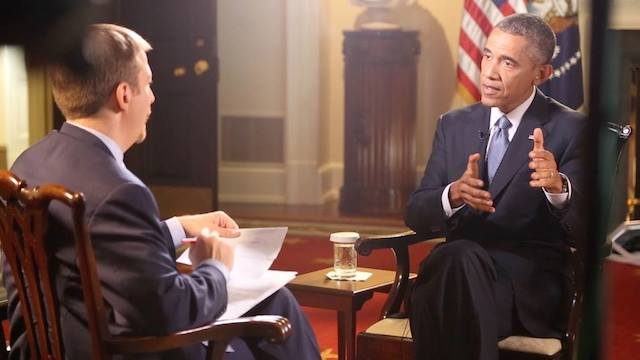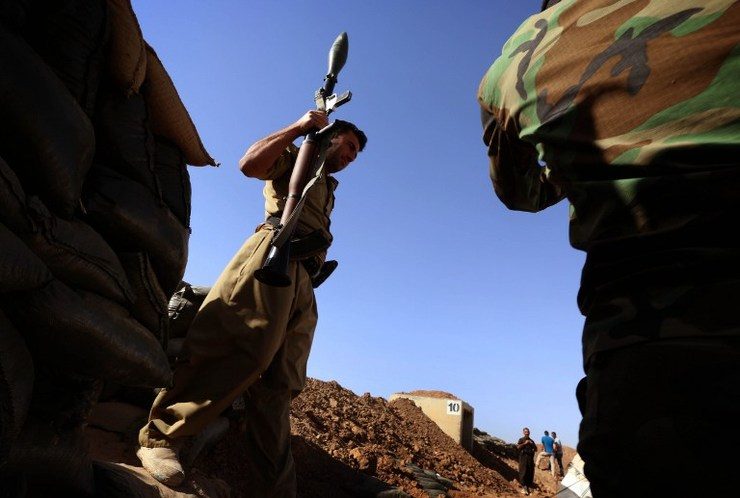SUMMARY
This is AI generated summarization, which may have errors. For context, always refer to the full article.

BARWANA, Iraq (2nd UPDATE) – US President Barack Obama has vowed to outline a long-awaited strategy against Islamic State jihadists on Wednesday, September 10, after Washington expanded its month-long air campaign to Iraq’s Sunni Arab heartland.
The new strikes deepen Washington’s involvement in the conflict and were a significant escalation for Obama, who made his political career opposing the war in Iraq and pulled out US troops in 2011.
Iraqi forces sought to capitalize on the strikes, which have largely been limited to the north since they began on August 8, launching an offensive against jihadists in the area and retaking the town of Barwana.
Obama, who has drawn flak for saying he did not have a strategy to combat Islamic State of Iraq and Syria (ISIS) jihadists, announced that he will make a speech on Wednesday to lay out his “game plan” to deal with the group.
“I’m preparing the country to make sure that we deal with a threat from” ISIS, Obama said in an interview aired Sunday, September 7, on NBC’s “Meet the Press.”
He said he would not be announcing the return of US ground troops to Iraq and would focus instead on a “counter-terrorism campaign” similar to other efforts over the last few years.
“We are going to systematically degrade their capabilities. We’re going to shrink the territory that they control. And ultimately we’re going to defeat them,” Obama said.
US warplanes bombed fighters from the ISIS jihadist group around a strategic dam on the Euphrates River in an area that the militants have repeatedly tried to capture from government troops and their Sunni militia allies.
Iraqi flag raised
“We conducted these strikes to prevent terrorists from further threatening the security of the dam, which remains under control of Iraqi security forces, with support from Sunni tribes,” Pentagon spokesman Rear Admiral John Kirby said.
“The potential loss of control of the dam or a catastrophic failure of the dam – and the flooding that might result – would have threatened US personnel and facilities in and around Baghdad, as well as thousands of Iraqi citizens,” he added.
Iraq moved Sunday to take advantage of the strikes, launching a drive against militants in the Haditha area and regaining ground.
“Joint forces backed by air support and tribesmen launched a wide attack to clear the areas surrounding the Haditha district,” security spokesman Lieutenant General Qassem Atta told Agence France-Presse.
The troops and militia retook the town of Barwana, east of Haditha, from the jihadists, who abandoned their weapons and vehicles in their retreat, an Agence France-Presse correspondent reported.
They lowered the black ISIS banner from the town’s main checkpoint and raised the Iraqi flag.

The victory was marred, however, when a mortar round slammed into the town, wounding Anbar Governor Ahmed al-Dulaimi as well as Abdulhakim al-Jughaifi, the administrative official responsible for Haditha, and seven soldiers.
A suicide bomber then struck the convoy carrying Dulaimi to a nearby hospital, killing a soldier and wounding six.
The only previous US strikes against ISIS outside of northern Iraq were carried out in support of an operation by the army, Shiite militia and Kurdish fighters to break a months-long siege of the Shiite Turkmen town of Amerli, north of Baghdad.
Dams have been a key target for the jihadists, and there has been major fighting around Iraq’s largest dam, on the Tigris River north of militant-held second city Mosul, which has been a major focus of the US air campaign.
The Haditha and Mosul dams are important sources of both power and irrigation water for farmers.
Sustained US strikes could provide a major boost to pro-government forces in Anbar, where all of one city and chunks of another have been out of state control for over nine months, along with other areas seized by militants since June.
Kurdish forces in the north have been bolstered by American strikes and recently took control of Mount Zardak, a strategic site east of Mosul that provides a commanding view of the surrounding area, a senior officer said.
‘Our capacity is limited’
Western governments have come under mounting pressure to take strong action against ISIS, which controls a swathe of neighboring Syria as well as significant territory north and west of Baghdad.
The jihadist group has carried out a spate of atrocities in areas under its control, some of which it has videotaped and paraded on the Internet.
The beheading of American journalists James Foley and Steven Sotloff has added to the pressure on Western leaders.
Obama outlined a plan for a broad international coalition to combat ISIS at a NATO summit on Friday, September 5, an announcement welcomed by Iraqi Foreign Minister Hoshyar Zebari.
“This is basically our fight… but we need the support — our capacity is limited, and we need the support to enhance our capacity,” Zebari told Agence France-Presse.
Arab League chief Nabil al-Arabi meanwhile called on the bloc’s 22 members to confront ISIS militarily as well as politically.
“What is needed is a clear decision for a comprehensive confrontation, militarily and politically,” Arabi said at a meeting of Arab foreign ministers in Cairo. – Rappler.com
Add a comment
How does this make you feel?
There are no comments yet. Add your comment to start the conversation.